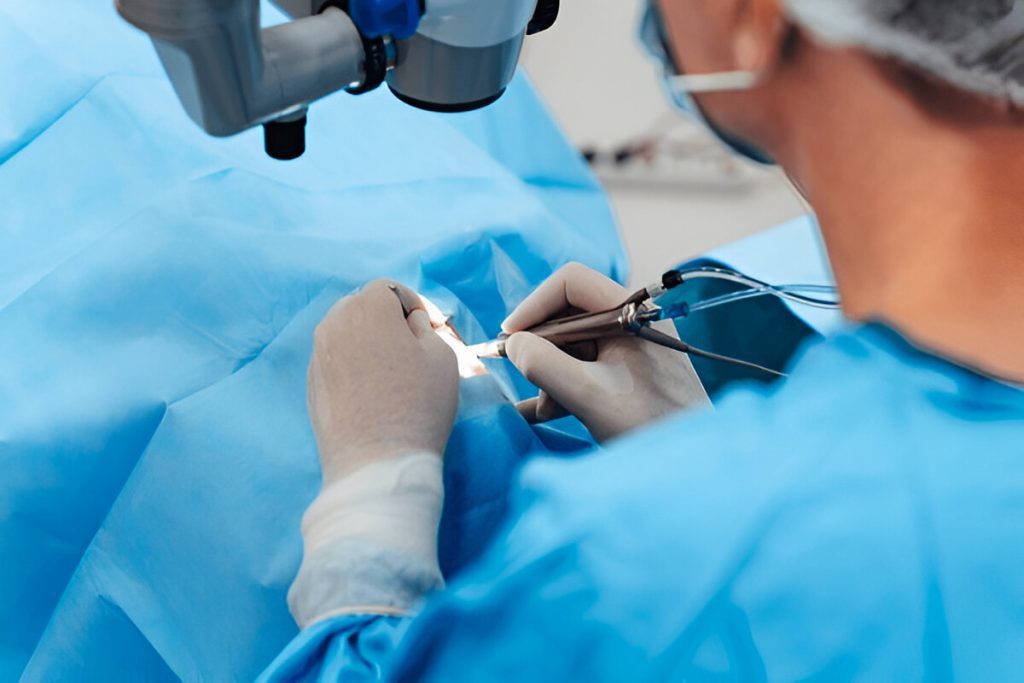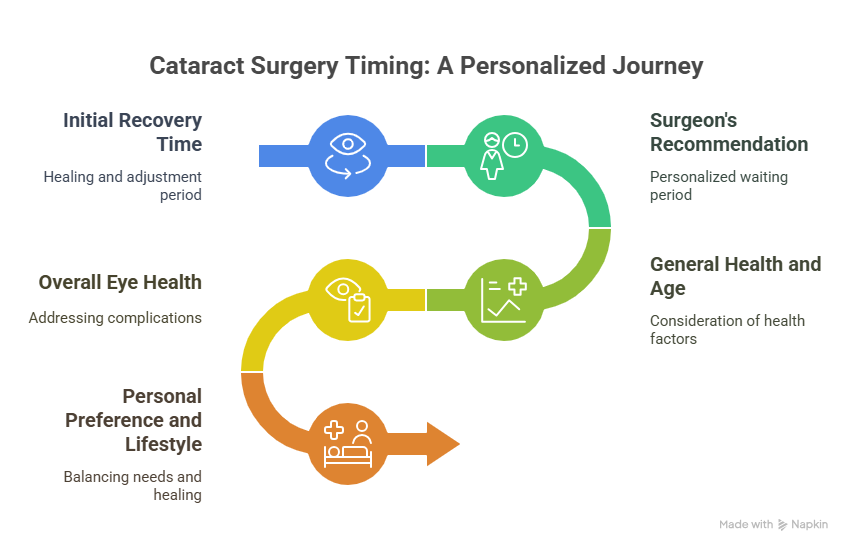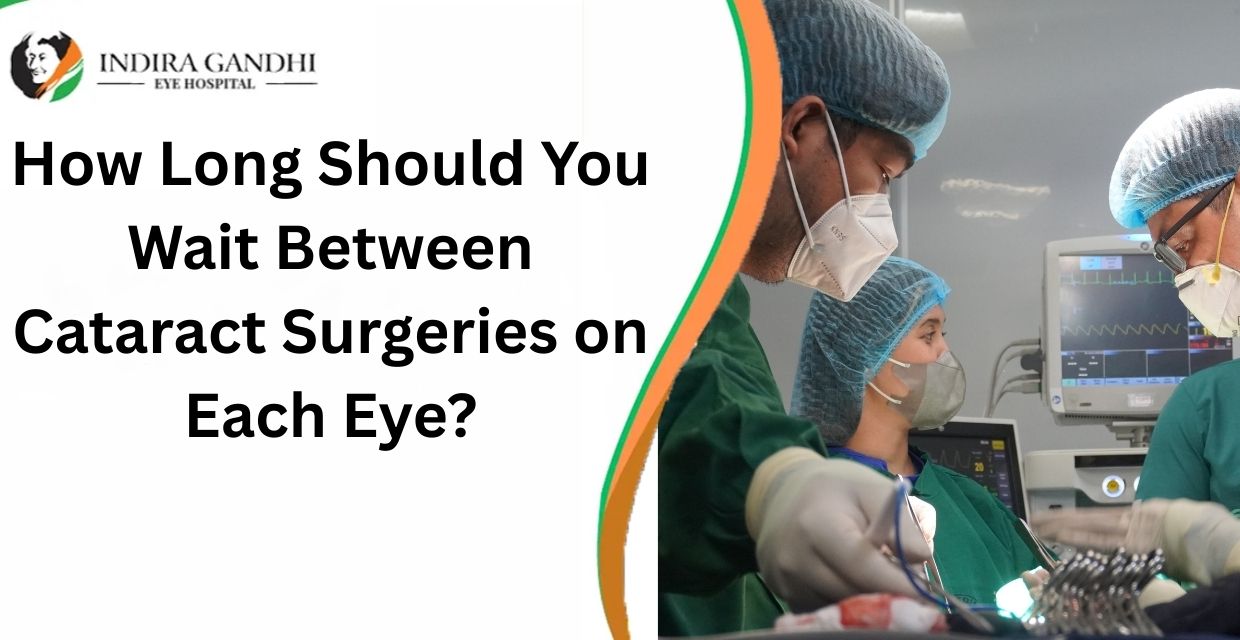|
Getting your Trinity Audio player ready...
|
How Long Should You Wait Between Cataract Surgeries on Each Eye – Cataract surgery is one of the most common and successful procedures performed today to restore vision. If you’re dealing with cataracts in both eyes, you may have questions about how long to wait between surgeries on each eye. Specifically, how long between cataract surgery on each eye is ideal for a smooth recovery and optimal results?
At Indira Gandhi Eye Hospital & Research Centre (IGEHRC), we understand that undergoing cataract surgery can be a significant decision. It’s important to have a clear understanding of the process, including the timing between surgeries, so you can make informed choices about your eye health.
In this blog, we will explore the factors that influence the decision to schedule cataract surgeries on both eyes, the typical waiting period, and what you can expect from the procedure and recovery process.
Understanding Cataract Surgery

Before we dive into the specifics of waiting times between cataract surgeries, let’s first understand what cataract surgery involves.
Cataracts occur when the natural lens of the eye becomes cloudy, impairing vision. The surgery involves removing the cloudy lens and replacing it with an artificial intraocular lens (IOL) that restores clear vision. The procedure is generally performed on one eye at a time. In most cases, both eyes are affected by cataracts, but it’s important to approach each surgery carefully to ensure the best outcome.
How Cataract Surgery is Typically Performed
Cataract surgery is a relatively quick and safe procedure, usually done on an outpatient basis. The most common technique is called phacoemulsification, where a small incision is made in the eye, and the cloudy lens is broken up and removed using ultrasound. The replacement IOL is then inserted, providing the patient with clear vision.
The surgery is typically painless, thanks to local anesthesia, and patients can return home the same day. Recovery time for each eye is relatively short, but it’s important to follow the instructions provided by your surgeon to ensure proper healing.
How Long Between Cataract Surgery on Each Eye?

Now, to answer the main question: how long between cataract surgery on each eye should you wait? The timing between surgeries is usually based on several factors:
- Recovery Time After the First Surgery: After the first eye is operated on, patients need time for that eye to heal and adjust to the new lens. The initial recovery period can range from a few days to several weeks, depending on the individual’s healing process and any complications.
- Your Surgeon’s Recommendation: Each patient’s case is different, and your surgeon will recommend a waiting period based on your specific needs. Typically, surgeons recommend waiting anywhere from 1 to 4 weeks between surgeries on each eye. Some people may even have the second surgery scheduled in as little as a week, while others may need more time to fully recover from the first surgery.
- General Health and Age: If you’re older or have certain health conditions, your doctor may suggest a longer waiting period between surgeries. People with other eye conditions, like glaucoma or macular degeneration, may need extra care and a longer recovery period.
- Overall Eye Health: If you have any complications or underlying eye health issues with the first eye, such as an infection or inflammation, it’s crucial to wait until the first eye is fully healed before proceeding with the second eye.
- Personal Preference and Lifestyle: In some cases, patients might want the second surgery to be scheduled sooner, especially if they are experiencing significant vision problems in both eyes. However, it’s essential to prioritize healing and follow the medical advice of your ophthalmologist.
Why Wait Between Surgeries?
The reason for waiting between surgeries is to ensure the first eye has fully healed before proceeding with the second. If both eyes were operated on at the same time, there could be an increased risk of complications, including infections or issues with the healing process. By performing one eye at a time, the surgeon is able to monitor the recovery progress, manage any potential complications, and make adjustments to the treatment plan as needed.
Moreover, the recovery process for cataract surgery typically involves using eye drops, wearing protective eye shields, and avoiding certain activities, such as heavy lifting or straining. It’s important to allow each eye the proper healing time to avoid complications like infection, inflammation, or improper lens placement.
What Can You Expect Between Surgeries?
If you’re preparing for cataract surgery on both eyes, understanding the recovery process between surgeries is important.
- Recovery from the First Surgery: After the first cataract surgery, you’ll need to follow your surgeon’s post-operative care instructions closely. This will likely include:
- Using prescribed eye drops to reduce inflammation and prevent infection
- Wearing an eye shield or patch while sleeping to protect the eye
- Avoiding strenuous activities or rubbing your eye
- Attending follow-up appointments to ensure proper healing
- Using prescribed eye drops to reduce inflammation and prevent infection
- Vision Improvement: After the first surgery, you’ll start to notice improvement in your vision. However, your vision might still fluctuate a bit during the healing process. This is normal and should stabilize as the eye heals fully.
- Waiting Period: During the waiting period between surgeries, it’s important to give your first eye ample time to heal. Most people can resume normal daily activities with one eye corrected, but you might experience some difficulty with depth perception or other minor visual challenges until both eyes are treated.
- The Second Surgery: Once the first eye has healed, your surgeon will schedule the second surgery. This process will be similar to the first, with the same recovery instructions.
- Post-Operative Care: After the second surgery, you’ll need to follow the same post-operative care instructions as the first. In most cases, both eyes will heal within a few weeks, and your vision will improve significantly.
What Happens If You Don’t Wait Long Enough Between Surgeries?
While some patients may feel eager to have both eyes treated quickly, it’s essential to follow your surgeon’s advice about the timing of cataract surgery on each eye. If you don’t wait long enough between surgeries, it can increase the risk of complications, including:
- Infection: Performing surgery on both eyes too quickly can increase the risk of infection, as the first eye may not have fully healed.
- Inflammation: Performing cataract surgery too soon can cause inflammation in the eye, which can affect your recovery and healing process.
- Inaccurate Vision Correction: If the first eye is still healing, it may not provide the most accurate results. This can lead to difficulty achieving balanced vision after both surgeries.
The Importance of Choosing the Right Eye Care Center
For those seeking cataract surgery, choosing the right eye care center is crucial to ensure a smooth and successful procedure. At cataract treatment in Gurgaon, we provide comprehensive cataract care with the latest technology and experienced surgeons. Whether you need to schedule a single or dual eye surgery, our expert team will guide you through the process, monitor your recovery, and ensure the best possible outcome.
Our goal at Indira Gandhi Eye Hospital & Research Centre (IGEHRC) is to provide personalized care, support, and resources to help you understand your cataract treatment options. We believe in giving our patients the information and guidance they need to make informed decisions about their eye health.
Conclusion
In conclusion, how long between cataract surgery on each eye depends on several factors, including your recovery from the first surgery, your surgeon’s recommendation, and your overall eye health. While the typical waiting period is between 1 to 4 weeks, your ophthalmologist will advise the best timeline based on your specific needs and progress.
Remember that cataract surgery is a safe and highly effective procedure that can significantly improve your quality of life. If you’re considering cataract surgery or have questions about the process, don’t hesitate to reach out to an experienced ophthalmologist at IGEHRC for guidance.
Taking the time to properly recover between surgeries and following your doctor’s advice will ensure that both eyes heal well and that your vision improves to the fullest extent. Trust in your eye care team to provide the best advice and treatment for your unique situation.
How many days gap between two eyes cataract surgery?
The typical gap between cataract surgeries on each eye is about 1 to 2 weeks, depending on how well the first eye heals and the surgeon’s recommendation. In some cases, doctors may wait longer if there are complications or specific health concerns.
How long is the wait for 2nd eye cataract surgery?
The wait time for second eye cataract surgery can range from a few days to a few weeks, based on your recovery, visual outcomes from the first surgery, and hospital scheduling. Most patients undergo the second procedure within 2 to 4 weeks of the first.
How long should you wait between a cataract operation?
Generally, it is advised to wait at least 1 week between cataract surgeries for each eye. This allows the surgeon to assess the healing and vision outcome of the first eye before proceeding with the second.
Is it safe to have both eyes operated on together for cataract?
In certain cases, especially with advanced surgical settings, both eyes may be operated on the same day (known as simultaneous bilateral cataract surgery). However, most doctors prefer to perform the surgeries separately to monitor the healing and reduce the risk of infection or complications.
What happens if I delay the second cataract surgery?
Delaying the second cataract surgery may lead to visual imbalance, where one eye has clear vision and the other remains blurry. This can cause eye strain, headaches, and difficulty with depth perception. It’s best to follow your ophthalmologist’s advice regarding the timing of the second procedure.












